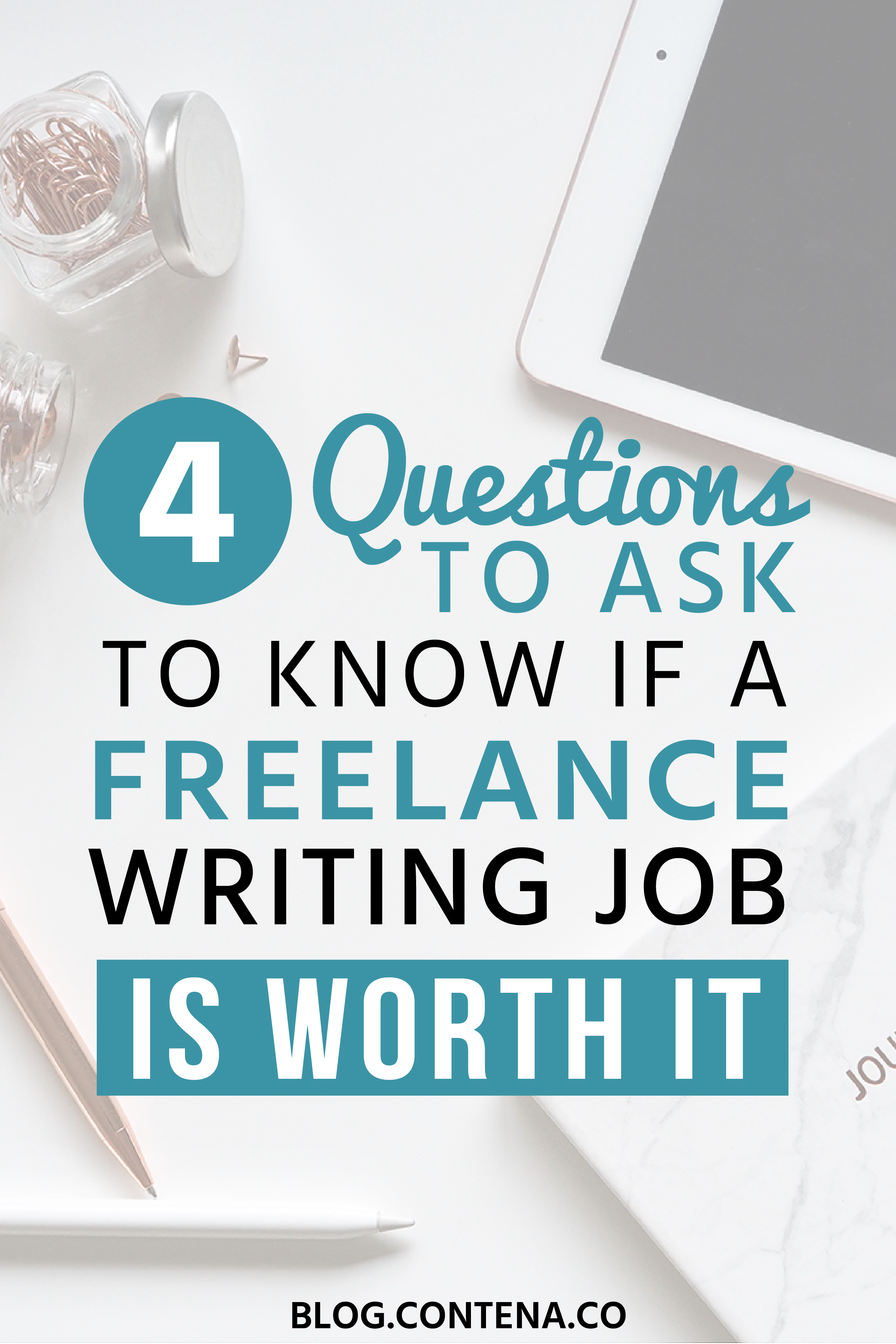Freelance writers spend a good majority of their day pitching for work. After all the time and effort put into looking for jobs, turning one down can seem counterintuitive.
I’m here to tell you that turning a job down might actually be a prudent business move.
A successful freelancer needs to be judicious with their time and resources. There are a lot of factors that go into making a job “worth it,” and they often depend on your personal choices and needs at the time.
For many freelancers, the decision whether or not to take a job primarily hangs on the pay.
Of course, while the pay rate of a job is undoubtedly a factor to be considered, it’s certainly not the only one.
Four critical questions every freelancer should ask to determine if a gig is worth it
1. “Does this job pay well?”
While it’s clear that money shouldn’t be the only determining factor in taking a job, it’s undoubtedly an important one.
Unfortunately, there are a lot of companies who underpay their writers. Even worse, it’s made acceptable by writers who continuously take said low rates. (Protip: Use Contena to find quality, high paying jobs with ease!)
While taking lower paid gigs as a newbie freelancer is okay, it’s not a sustainable way to run a successful freelancing business.
If you’re okay with taking lower rates, make sure the job checks off boxes in other areas. For example, content mills are notorious for paying writers low rates, but still are a worthwhile option for some freelancers because of their quick payments and plentiful work.
2. “Do you have the time to take on this client?”
Any seasoned freelancer will tell you that the adage “time is money” is certainly spot on in our field of work. When it comes to taking on a new job, there are two aspects of time you need to take into consideration.
Schedule
You may think taking on as many jobs as possible is the quickest and most efficient way to beef up your income.
You’d also be wrong.
If you take on every job that comes your way, you’ll end up with an overloaded schedule. A too-full workload can eventually be detrimental to your goals as you can experience burnout, produce less-than-stellar work, and even lose a client in the process.
Additionally, when you jam-pack your schedule with the first clients you come across, you prevent yourself from being able to take on more lucrative gigs.
Time Spent
Another consideration in the debate over taking on a new client is the time expenditure the job will require.
As a writer, you already know that many projects often require a combination of skills such as research, editing, formatting, image sourcing, and much more. However, a gig loses some of its charm when one (or more) of those tasks starts taking on a more significant role than you thought.
For example, let’s say you have three clients paying the same flat fee rate for an article. All are equally “valuable” jobs, right?
Wrong.
- Project A is a research-heavy job and requires thorough of reading through studies and citing sources. This project requires an expert level of knowledge.
- Project B seems to be straightforward, but the client required multiple rounds of rewrites and edits. You’ve spent an extraordinary amount of time responding to frantic emails asking for “additions” even once the piece was completed.
- Project C is a thorough piece, requiring some background research and a reasonable amount of edits.
All three projects pay the same amount but require a vastly different amount of time and effort. Project C, although invoicing the same as the other jobs, uses up less of your time, energy, and resources, and therefore is more valuable.
Take note, the way you charge (hourly, by the word, flat fee, etc.) will also play into how worthwhile these jobs will ultimately wind up being.

3. “Will this job give you exposure or add to your portfolio?”
Even if a job isn’t necessarily high paying, there are still a few ways they can be beneficial to your career.
Exposure
Exposure is just one way that freelancers can boost their business in a non-monetary direction.
By writing for well-known or highly visible clients, freelancers can gain credibility and hopefully, strong references for future clients.
Those little “as-seen-on” icons at the bottom of your website can general some serious traction!
Portfolio
Ending up with work that you can showcase in your portfolio is also a big factor when it comes to deciding if a job is right for you.
Especially for those just starting out in the freelancing world, developing your portfolio is a critical step in building your credibility.
Your portfolio is essential to your future job hunts as it acts as a resume of sorts. When you’re in talks with potential clients, more often than not they’ll ask for writing samples. These samples help show off your style, tone, and understanding of a topic or target audience.
Your portfolio samples can be the deciding factor for many clients looking to hire a new writer.
4. “Is this a steady job?”
While the hope is all clients turn into repeat customers, that’s not always how it works out. Because of this and the very unpredictable nature of freelancing, anchor clients are a freelancers’ dream.
An anchor client is one that you rely on for steady work. They often involve a long-term contract with regular, recurring payments.
Often times having a reliable income stream is many times too good to pass up. Even if the gig doesn’t check all your boxes, steady work can be a reliable addition to your workload.
The Bottom Line
Turning down a gig can feel uncomfortable, there’s no denying that. But there’s so much more behind the value of a job beyond a number on an invoice.
When deciding if a job is a good fit, you should look at the position as a whole.
The questions you ask to decide if a job is worthwhile and the decision-making process should be wholly unique to you.
For example, does the client or company align with your goals or values? Are you comfortable having your name attached to this company or client? As a freelancer, your reputation is extremely important and is often worth more than a job can pay.
Additionally, there are aspects of a job that make them appealing that simply aren’t as tangible. Are you passionate about the subject matter or the clients’ mission? Sometimes working on something you enjoy is preferable to a job that pays more. After all, one surefire way to avoid freelancer burnout is to do what you love!
There are questions about whether or not a job is worthwhile only you can answer, and it’s well worth asking them before taking on any job.










